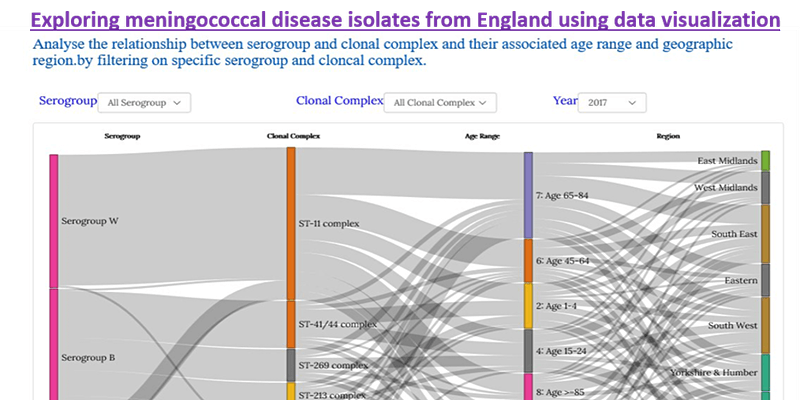10 years of the Meningitis Research Foundation Meningococcus Genome Library
PubMLST Forum Event: Hybrid meeting 17th September, online or in person.

The Gram-negative diplococcus Neisseria meningitidis, the meningococcus, remains a globally important causative agent of meningitis and septicaemia (severe sepsis). Ten years ago, the Meningitis Research Foundation funded the establishment of the UK ‘Meningitis Research Foundation Meningococcus Genome Library’ (MRF-MGL), with a multi-centre award to Public Health England, the University of Oxford and the Wellcome Trust Sanger Institute. Embedded within the PubMLST.org platform MRF-MGL stores provenance, demographic, epidemiological, and whole genome sequence information for more than 5,000 meningococci isolated from patients in the UK over the past 10 years. Over this time, sequence-based molecular typing has become an essential component of invasive meningococcal disease surveillance world-wide and standardised typing methods and schemes have allowed comparability across reference and research laboratories in different countries. Shortly after its inception, the MRF-MGL contributed to the introduction of the ACYW meningococcal vaccines into the UK and it remains an essential resource, nationally and internationally.
To mark this anniversary, we held a hybrid forum event (in person and online) consisting of four one-hour sessions, each with three 15 minute presentations and a 15-minute panel discussion. The two morning sessions highlighted the establishment and public health application of the meningococcal genome library and the afternoon sessions highlighted the contributions from external users, including industry.
Schedule of Events
Foundation of the MRF-MGL
- 10:00-10:15: Chris Tang (University of Oxford, UK)
- 10.15-10.30: Linda Glennie (MRF, UK)
- 10.30-10.45: Jay Lucidarme (PHE, UK) - The MGL and Public Health – the Meningococcal Reference Unit perspective
- 10.45-11.00: Questions for speakers
- 11:00-11:15: Break
Development of the MRF-MGL
- 11:15-11.30: Holly Bratcher (University of Oxford, UK) - Structure and Validation of the MRF-MGL Data
- 11.30-11.45: Andrew Smith (University of Glasgow, UK), Claire Cameron (Public Health Scotland, UK), Charlene Rodrigues (University of Oxford, UK) - Scottish Reference Lab use of MRF-MGL in near real-time; MRF-MGL – Health Protection Application; Translating microbial genomics for public health benefit: Meningococcal Deduced Vaccine Reactivity (MenDeVAR) Index
- 11.45-12.00: Keith Jolley (University of Oxford, UK) - Development Roadmap: Interactive Dashboards and Visual Analytics
- 12.00-12.15: Questions for speakers
- 12:15-13:00: Lunch break
Global User Perspectives
- 13:00-14:00: Chris Bayliss (University of Leicester, UK) - Genomic Exploration of Meningococcal Phase Variation
- 13.15-13.30: Muhamed-Kheir Taha (WHO Collaborating Centres, France) - The global context of the MRF MGL: Interactions with the WHO collaborating centres for meningitis
- 13.30-13.45: David Stephens (Emory University, USA) - PubMLST-MGL and Unlocking Neisseria spp. evolution and pathogenesis: the N. meningitidis urethritis clade
- 13.45-14.00: Questions for speakers
- 14:00-14:15: Break
Industry Perspectives
- 14:15-14.30: Marco Spinsanti (GSK, Italy), Isabel Delany (GSK, Italy) - GSK perspective of MRF-MGL: a case study on genotype-phenotype analysis highlighting association of fHbp expression with IMD
- 14.30-14.45: Jamie Findow (Pfizer, UK) - The role of genomic data in Pfizer’s meningococcal vaccine development
- 14.45-15.00: Questions for speakers
- 15:00-15:15: Martin Maiden - Closing remarks